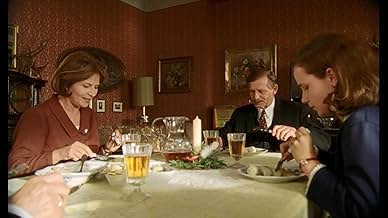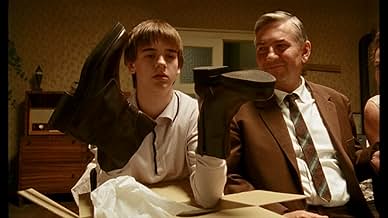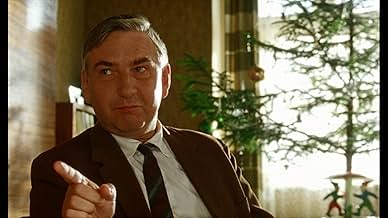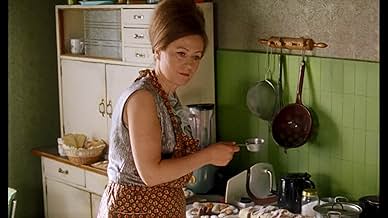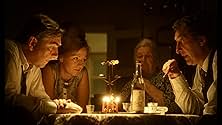Pelísky
- 1999
- 1h 55m
ÉVALUATION IMDb
8,1/10
6,7 k
MA NOTE
Ajouter une intrigue dans votre langueTwo families, Sebkovi and Krausovi, are celebrating Christmas, but not everyone is in a good mood. Teenage kids think their fathers are totally stupid; fathers are sure their children are no... Tout lireTwo families, Sebkovi and Krausovi, are celebrating Christmas, but not everyone is in a good mood. Teenage kids think their fathers are totally stupid; fathers are sure their children are nothing more than rebels, hating anything they say.Two families, Sebkovi and Krausovi, are celebrating Christmas, but not everyone is in a good mood. Teenage kids think their fathers are totally stupid; fathers are sure their children are nothing more than rebels, hating anything they say.
- Director
- Writers
- Stars
- Prix
- 8 victoires et 8 nominations au total
Marek Javorský
- Péta
- (as Marek Morvai Javorský)
Avis en vedette
Cosy Dens (1999) is the ironic name given to the film that was called Pelísky in Czech. The movie was directed by Jan Hrebejk.
Two families are celebrating Christmas in the same apartment house during the Prague Spring. The father of one family is patriotic and anti-Russian. The father of the other is an army officer, and pro-Russian. The basic plot revolves around the relationships between these families. Clearly, the families symbolize two aspects of Czech society in 1968--some refused to accept the Soviet occupation, and denounced it when they could. Others turned the occupation to their advantage.
The movie has several plot threads. The two fathers argue constantly. The young son of one family loves the daughter of the other. (It's not Romeo and Juliet--his love is unrequited.) An aunt hopes to find a husband, but her son and her bad luck get in the way.
It's interesting that even the army officer's family celebrate with a traditional Christmas. It's very interesting--at least to a non-Czech--that the families keep a live carp in the bathtub, which is apparently a traditional aspect of the Czech Christmas.
The film is not just a comedy. It is a symbolic representation of the tensions of the Czech people, who must adapt to the fact that Russia controls their destiny. They don't know--but we know--that the Prague Spring will come to an end not through liberation, but through the roar of the Warsaw Pact tanks rolling through Prague.
There's a long shot of birds in a cage near the end. The presenter of the film made the symbolism clear. The birds have enough food and water to survive, but the central fact of their existence--like that of the Czechs--is that they are not free.
Seen as part of the outstanding Alan Lutkus International Film Series at SUNY Geneseo. The film is on DVD, and was projected onto the large screen. It will work on the small screen as well.
Two families are celebrating Christmas in the same apartment house during the Prague Spring. The father of one family is patriotic and anti-Russian. The father of the other is an army officer, and pro-Russian. The basic plot revolves around the relationships between these families. Clearly, the families symbolize two aspects of Czech society in 1968--some refused to accept the Soviet occupation, and denounced it when they could. Others turned the occupation to their advantage.
The movie has several plot threads. The two fathers argue constantly. The young son of one family loves the daughter of the other. (It's not Romeo and Juliet--his love is unrequited.) An aunt hopes to find a husband, but her son and her bad luck get in the way.
It's interesting that even the army officer's family celebrate with a traditional Christmas. It's very interesting--at least to a non-Czech--that the families keep a live carp in the bathtub, which is apparently a traditional aspect of the Czech Christmas.
The film is not just a comedy. It is a symbolic representation of the tensions of the Czech people, who must adapt to the fact that Russia controls their destiny. They don't know--but we know--that the Prague Spring will come to an end not through liberation, but through the roar of the Warsaw Pact tanks rolling through Prague.
There's a long shot of birds in a cage near the end. The presenter of the film made the symbolism clear. The birds have enough food and water to survive, but the central fact of their existence--like that of the Czechs--is that they are not free.
Seen as part of the outstanding Alan Lutkus International Film Series at SUNY Geneseo. The film is on DVD, and was projected onto the large screen. It will work on the small screen as well.
I really enjoyed watching this movie. I found this gem by accident and I'm surprised that it hasn't found it's way to a major audience here in Germany although quite a few Czech movies run on public television. The movie is funny and witty but at times also sad and deadly serious. Like many other Czech movies the story is made up of small parts that fit together as a whole picture. There's the stubborn army officer a convinced communist and his family, there's the war hero that strongly opposes the communist regime a choleric and his family and the single teacher and her son who try to find a new man for the family and there are the teenagers of those families that don't really care about politics or what their parents think is important. Those are the main characters that form a whole picture of life in Czechoslovakia during the Prague spring in 1968. The stories switch at easy from funny to hilarious to sad and back. I recommend this movie to everyone to watch. It is certainly worth the time. Other reviews state that you have to be Czech to fully understand everything. Well, I could relate to the characters as well though I might have missed a cultural reference or two.
A beautifully understated story of ordinary people living their everyday lives through the trying times of Christmas '67 and the Prague Spring during the run up to the Soviet invasion. While the setting has be caught with stark and depressing realism, the film is perfectly balanced with a gently comic and bittersweet observation of the families and their relationships as they struggle through events from the mundane to the tragic. Personal loss, both of freedom and of loved ones, and the way life still manages to go on has been captured with deceptive ease and without resorting to the usual cliches and predictable attempts at closure that so often seem to pollute western cinema of this type.
10Fnord233
Prague in 1968 prior to the Soviet invasion. The setting is ideal for a political drama, but Czech artists prefer to make a comedy with political background. The action takes place in a house, where families from different political camps (pro-communist vs. anti-communist) live together. The story is told in such a warm, witty and funny way that it immediately resembles the golden years of Czech movie industry in the 70's and 80's. This movie was a tremendous hit on the local Czech market, unfortunately it has never reached my country (Poland). I've had a chance to see it only on the Warsaw Film Festival. It's sad but all the time distributors prefer to show s****y Hollywood cheesy-style romances or action packs, instead real-value movies. Definitely one of the movies of 1999 IMHO. The same goes for other Czech movie - "Return of the Idiot" (Navrat Idiota) - watch out for Czechs, they are on the right track again.
i saw pelisky in 2000 at the international film festival in aukland, new zealand. almost 5 years later, having only seen the film that one time, i cannot forget how much i loved it. wonderfully funny and tragic, extremely well-acted, by far the best foreign language film in the festival. it was the the highest grossing czech film of the year at the czech box office, third only to titanic and kolya. unfortunately, i'm not sure if it made it into any American theatres and i have not been able to locate a copy since i returned home. if at all possible you get your hands on a copy of pelisky, i promise you will adore this film.
Le saviez-vous
- AnecdotesMost of the jokes used in the movie are based on Czech writer Petr Sabach's book "Hovno hori" ("Shit burns"). The book consists of various unconnected stories.
- GaffesWhen Elien receives the package from America, it has three stamps affixed totaling only 8 cents. Notwithstanding that this is a paltry amount of postage to send a heavy package abroad, the three stamps had not been yet issued in America in December 1967. (The green Jefferson stamps were issued January 1968 and the larger Eisenhower stamp not until 1969)
- ConnexionsFeatured in Kovy: Vsehochut #1 (2016)
Meilleurs choix
Connectez-vous pour évaluer et surveiller les recommandations personnalisées
- How long is Cosy Dens?Propulsé par Alexa
Détails
- Date de sortie
- Pays d’origine
- Site officiel
- Langue
- Aussi connu sous le nom de
- Cosy Dens
- Lieux de tournage
- sociétés de production
- Consultez plus de crédits d'entreprise sur IMDbPro
Box-office
- Brut – à l'échelle mondiale
- 2 227 953 $ US
- Durée
- 1h 55m(115 min)
- Couleur
- Mixage
- Rapport de forme
- 1.66 : 1
Contribuer à cette page
Suggérer une modification ou ajouter du contenu manquant

